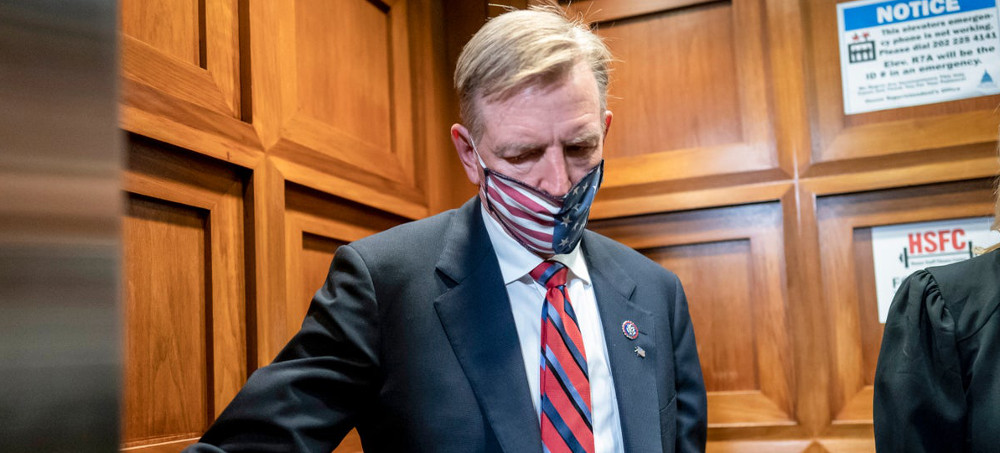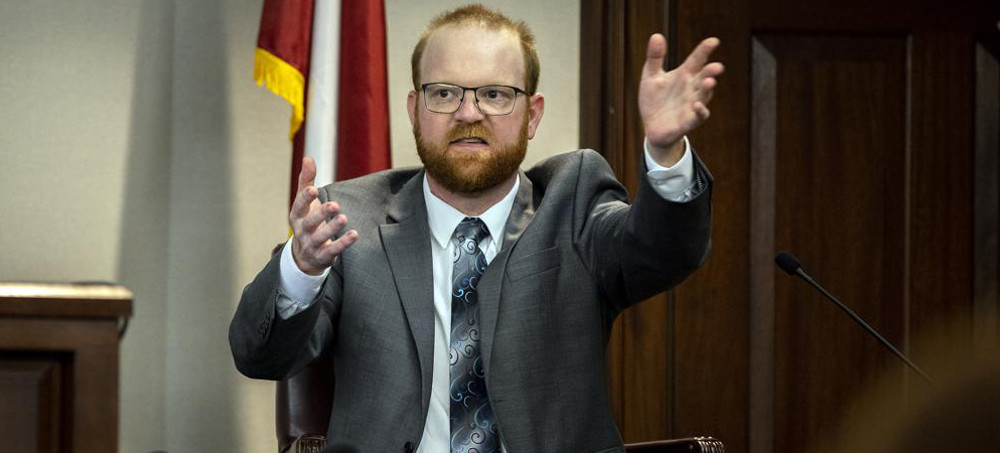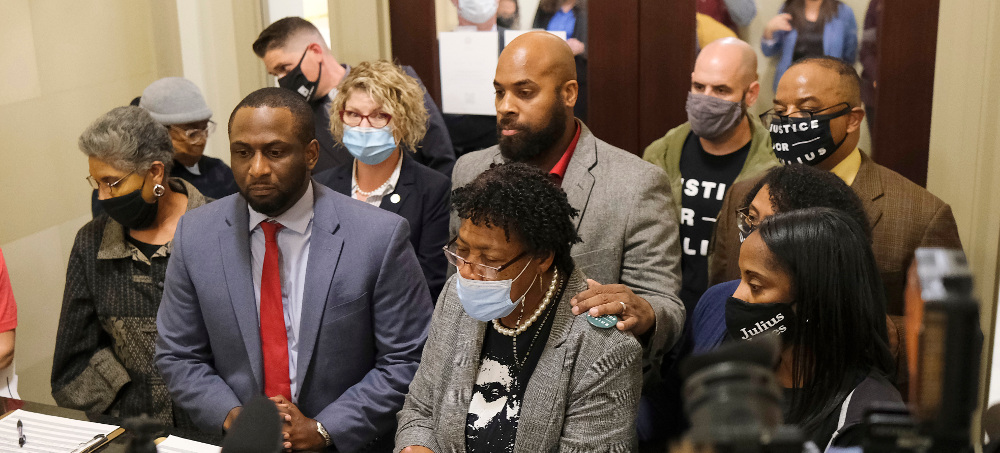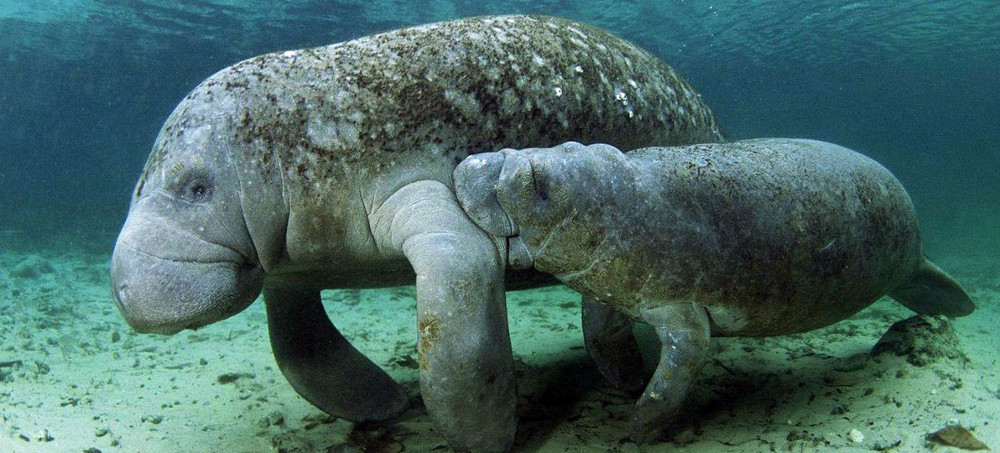Live on the homepage now!
Reader Supported News
In principle, voters should judge politicians by their actions; they should support politicians who pursue policies that help them, oppose politicians whose policies would hurt them. To do this, however, voters should have a reasonably good idea of what policy is doing.
Unfortunately, when it comes to economic policy — which should be the easiest kind of policy to evaluate, since its effects are visible in everyone’s daily life — there are few reasons to be optimistic about the relationship between policy and public opinion.
 Republican Paul Gosar leaves his office on 17 November. (photo: J Scott Applewhite/AP)
Republican Paul Gosar leaves his office on 17 November. (photo: J Scott Applewhite/AP)
ALSO SEE: McCarthy Pledges to Restore Greene, Gosar to Committees if GOP Wins House
Republican congressman retweeted conservative podcaster Elijah Schaffer’s tweet of the violent video
While Gosar had previously deleted the video, after the House voted to censure him, Gosar retweeted the conservative podcaster Elijah Schaffer’s tweet of the video that was captioned: “Really well done. We love @DrPaulGosar, don’t we folks?” The retweet appears to have since been undone.
Gosar also retweeted other Republican politicians and public figures, both on his personal and congressional Twitter accounts, that have called Gosar a political “martyr” and denounced his censure.
Gosar has not apologized for the video and called the censure “kabuki theater” and a “hysterical mob” in a series of new tweets published after the vote.
Following the censure vote, Gosar also released a statement saying that his censure could incite violence, comparing the censure to the events that led up to the 2015 Charlie Hebdo massacre.
“I remind everyone that pretending to be upset over a cartoon is what happened to the Charlie Hebdo magazine in France,” said Gosar. “All right-thinking people condemned that then, and they should condemn the Democrats now for their violation of free speech.”
On Wednesday the House voted to censure Gosar, with 223 in favor and 207 against. While the vote occurred mostly along party lines, three Republicans broke with their party line. Congressman Adam Kinzinger of Illinois and Congresswoman Liz Cheney of Wyoming voted in favor of censuring Gosar, and Congressman David Joyce of Ohio voted “present”, the lone Republican member to do so.
Republican members have been called out in the past for threatening violence against Democratic representatives, particularly women of color. In February, the House stripped the Georgia congresswoman Marjorie Taylor Greene from her committee assignments after her social media posts were flagged for supporting violence against Ocasio-Cortez, the Minnesota congresswoman Ilhan Omar and Michigan congresswoman Rashida Tlaib.
 Travis McMichael speaks from the witness stand during his trial Wednesday, Nov. 17, 2021, in Brunswick, Georgia. (photo: Stephen B. Morton/AP)
Travis McMichael speaks from the witness stand during his trial Wednesday, Nov. 17, 2021, in Brunswick, Georgia. (photo: Stephen B. Morton/AP)
ALSO SEE: Arbery Suspect's Lawyer Wanted 'No More Black Pastors.' So Scores Showed Up.
Under cross-examination by the prosecution on his second day of testimony, Travis McMichael said he was “under the impression” that Arbery could be a threat because he was running straight at him and he had seen Arbery trying to get into the truck of a neighbor who had joined in a pursuit of Arbery.
“All he’s done is run away from you,” prosecutor Linda Dunikoski said. “And you pulled out a shotgun and pointed it at him.”
Cellphone video from the Feb. 23, 2020, shooting — replayed in court Thursday — shows Arbery running around the back of McMichael’s pickup truck after McMichael first points the shotgun while standing next to the open driver’s side door. Arbery then runs around the passenger side as McMichael moves to the front and the two come face to face. The truck blocks any view of them until the first gunshot sounds.
McMichael’s remarks Wednesday marked the first time any of the three white men charged with murder in Arbery’s death has spoken publicly about the killing. He testified Wednesday that Arbery forced him to make a split-second “life-or-death” decision by attacking him and grabbing his shotgun.
Dunikoski noted Thursday that’s not what McMichael told police in an interview about two hours after the shooting occurred.
“So you didn’t shoot him because he grabbed the barrel of your shotgun,” Dunikoski said. “You shot him because he came around that corner and you were right there and you just pulled the trigger immediately.”
“No, I was struck,” McMichael replied. “We were face to face, I’m being struck and that’s when I shot.”
McMichael said he had approached Arbery because neighbors indicated something had happened down the road in his coastal Georgia neighborhood of Brunswick and he wanted to ask Arbery about it. Arbery was running in the neighborhood at the time. He said Arbery stopped, then took off running when McMichael told him police were on the way.
Asked how many times he had previously pulled up behind strangers in the neighborhood to ask them what they were doing there, McMichael said never.
“You know that no one has to talk to anyone they don’t want to talk to, right?” Dunikoski said.
The prosecutor also pressed McMichael on why he didn’t include some details of his testimony Wednesday in his written statement to police, namely the part about his telling Arbery police were on the way.
McMichael said he was “under stress, nervous, scared” at the time of his police interview and “probably being choppy.”
“What were you nervous about?” Dunikoski asked.
“I just killed a man,” McMichael responded. “I had blood on myself. It was the most traumatic event of my life.”
“You were nervous because you thought you were going to jail, right?” Dunikoski asked.
“No. I gave them a statement,” McMichael said.
McMichael and his father, Greg McMichael, armed themselves and pursued Arbery in a pickup truck after he ran past their home from the house under construction. A neighbor, William “Roddie” Bryan, joined the chase in his own truck and recorded cellphone video. Arbery’s killing deepened a national outcry over racial injustice after the video of his death leaked online.
Outside the Glynn County courthouse Thursday, hundreds of pastors gathered in response to a defense lawyer’s bid to keep Black ministers out of the courtroom.
The Rev. Jesse Jackson again joined Arbery’s family in the courtroom, even as Bryan attorney Kevin Gough renewed his request to keep pastors like Jackson out. The issue was brought up outside the jury’s presence, and Judge Timothy Walmsley declined to take it up again, noting he’d already rejected the same motion twice.
“The court’s position is already in the record,” Walmsley said.
Gough first asked the judge last week to remove the Rev. Al Sharpton from the court, saying the civil rights activist was trying to influence the jury, which is disproportionately white. The later called Gough’s remarks “reprehensible.”
Prosecutors contend there was no justification for McMichael and his father to arm themselves and chase Arbery when he ran past their Georgia home. The McMichaels told police they suspected Arbery was a burglar because security cameras had recorded him several times in the unfinished house on their street.
Prosecutors say the men chased Arbery for five minutes and used their trucks to prevent him from fleeing their neighborhood before Travis McMichael shot him. They say there’s no evidence that Arbery — who had enrolled at a technical college to study to become an electrician like his uncles — had committed any crimes.
 "I blamed myself for a long time," one survivor said. (photo: Getty)
"I blamed myself for a long time," one survivor said. (photo: Getty)
“I blamed myself for a long time,” one survivor told VICE News. “I think a lot of that was because of the way that the school handled it.”
Then, in 2014, when she was 15 years old, Wombwell tried to report that she had been raped in the woods near her school, Myers Park School in Charlotte, North Carolina, by a classmate. And, in response, the school principal suggested that Wombwell could be suspended for having sex on campus if her account turned out to be untrue, according to interviews with Wombwell and a lawsuit she filed in 2019.
Wombwell didn’t pursue an investigation. “Nothing happened,” recalled Wombwell, now 22.
Wombwell is one of multiple women to say that they tried to report sexual assault to officials at Charlotte-Mecklenburg Schools, only to meet with indifference or even aggression. One woman, Serena Evans, said that after she was raped in a Myers Park bathroom in 2016, she, too, was threatened with suspension. Another former student told VICE News that she reported being raped to Myers Park officials in late 2014 and they seemed to believe her—but said that, essentially, there was next to nothing she or they could do about it. And yet another woman has anonymously filed a still-pending lawsuit against Charlotte-Mecklenburg Schools, in a case that sounds deeply similar to Wombwell’s.
Charlotte-Mecklenburg Schools is now in the midst of yet another scandal over a school’s handling of sexual assault allegations. Earlier this month, a 15-year-old student at Hawthorne Academy of Health Sciences, another high school in the district, accused the school of suspending her after she reported a male classmate for sexual assault.
In addition to being suspended, the girl was told to take a weekend class called Sexual Harassment Is Preventable.
“Up until this point, when I thought about the fact that they threatened to suspend me if I did an investigation, I always sort of thought it was a threat to stop me from speaking out,” Wombwell said. “And so to see them actually suspending a student—I can’t help but see myself in her and wonder what would have happened to me if I had decided to go through with an investigation.”
Wombwell said that the rape, and the way the administration failed to really handle it, shaped the rest of her high school career. She couldn’t go to football games, she said, because her alleged rapist was in the marching band. When he showed up at prom, she got so upset she left early. She still struggles with post-traumatic stress disorder.
“I blamed myself for a long time,” she told VICE News. “I think a lot of that was because of the way that the school handled it.”
In late 2016, when Evans told a Myers Park administrator that, just days earlier, she’d been raped in a school bathroom, she felt like she was walking through a dream. In her shock and pain, the world had gone fuzzy.
But she says the administrator’s response still tore through that haze.
The administrator, Evans and her mother told VICE News in an interview, said that if her alleged rapist was found innocent, Evans would be suspended for having been in the boys’ bathroom. Evans’ mother, Kay Mayes, said that the administrator also warned them to keep quiet about what had happened.
Inside her head, Evans recalled screaming, “Why don’t you believe me?”
In emails to Myers Park administrators from the months after the alleged rape, Mayes pleaded for Evans’ alleged attacker to undergo counseling. But, by March 2017, Mayes had had enough.
“I no longer believe that you (the school, CMS) are going to give me any info and updates, nor do anything about the situation on Serena's behalf,” she wrote. “I am tired of waiting around for you all to reach back out.”
“CMS [Charlotte-Mecklenburg Schools] cannot provide information about matters involving student discipline or specific cases in which there are ongoing investigations, pending or settled litigation, or otherwise involve confidential student or staff data,” a spokesperson for Charlotte-Mecklenburg Schools told VICE News in an email, in response to a detailed list of allegations in this story. “Likewise, CMS cannot provide information about specific personnel matters such as employee suspensions.”
“District and Board of Education leadership take allegations of sexual misconduct seriously,” the spokesperson added.
Evans, now 20, said that she did “everything right.”
“I was a star athlete. I never skipped class, never skipped school, I got good grades,” said Evans. “I had never been into the woods. I didn’t party, didn’t do drugs. I didn’t hook up with a bunch of people. This can still happen to people that literally do everything right. I think that’s what’s really hitting people now.”
Evans has not sued Charlotte-Mecklenburg Schools, and Wombwell settled her lawsuit after, she said, it became clear that real change would not come from the courts. (Charlotte-Mecklenburg Schools did not reply to a specific question about the settlement, but the Charlotte Ledger has previously reported that the settlement didn’t include an admission of wrongdoing on the district’s part.)
The other woman who has sued over sexual assault allegations at Charlotte-Mecklenburg Schools is known in court documents only as “Jane Doe.” According to her ongoing lawsuit, Doe was a junior in 2015 when a male student pulled her into the woods near campus and sexually assaulted her.
When Doe emerged from the woods, “Doe appeared both distressed and disheveled. Her hair was in disarray, she had mud on her clothing, her glasses were broken, and there was semen on her shirt,” an amended version of the lawsuit’s complaint alleges. But even after Doe allegedly told a local school resource officer that she’d been sexually assaulted, two of the defendants in the lawsuit did not take “a statement from Ms. Doe or otherwise meaningfully investigate her complaint.”
Instead, per the lawsuit, the Charlotte-Mecklenburg officials accepted the alleged attacker’s claim that the encounter was consensual. “Furthermore, none of the defendants offered to transport Ms. Doe to a hospital or otherwise assist her in reporting the rape to local law enforcement.”
The school resource officer also allegedly “warned Ms. Doe that if she was not telling the truth about the sexual assault she could be charged with a crime”—an echo of the warning Wombwell said she’d received the year before. The officer denied this allegation in one legal filing.
In court papers, the defendants have broadly denied wrongdoing.
Administrators for the school said in those filings that they didn’t take a statement from Doe because her parents prohibited it; they also didn’t take her to the hospital, they said, “or otherwise assist her in reporting a rape to law enforcement because she did not report a rape at that time.” The school resource officer said that he filed a noncriminal police report of Doe’s account, which “reflects what she told him.” He also claimed that he didn’t go to the hospital because Doe’s mother wanted “a detective to come to interview her daughter.”
The case remains open. But Doe ended up leaving Myers Park, as well as her job at the local mall. According to the complaint, her fear of running into her alleged assailant, “given the lack of consequences for his sexual attack against her, has affected what jobs she takes, where she works, and what shifts she accepts.”
The mother of the student from Hawthorne Academy who reported being sexually assaulted, whom VICE News is not naming, said that her daughter is just trying to go to school like normal. But realizing that this isn’t the first time a Charlotte-Mecklenburg school has been accused of mishandling a sexual misconduct allegation has been extremely frustrating, she said.
“My daughter constantly questioned whether she had done the right thing or not. And I wanted her to know that she did,” the mother said. “And I wanted CMS [Charlotte-Mecklenburg Schools] to be aware that these issues are still going on.”
Police had also investigated her daughter’s claims and the male classmate had confessed to the cops, the student’s mother told VICE News. The Charlotte-Mecklenburg Police Department didn’t return a VICE News request for charges connected to the case, but local news outlet WBTV reported that a minor was charged with sexual battery in connection to the report.
Hawthorne Academy, however, found that there was no evidence that the district’s sexual harassment policy had been violated, per a document provided to VICE News. Instead, the school found that there was “evidence of a violation” of a rule against falsifying information.
The mother said that Hawthorne Academy Assistant Principal Nina Adams basically told her, “What the police investigation concludes had nothing to do with the school investigation. We didn’t find anything. We have to dismiss the case.”
Her daughter’s suspension has been put on hold, the mother said. Days after WBTV shared their accounts, the outlet reported that another Hawthorne Academy student had also been urged to stay quiet about being sexually assaulted. The student said that the school claimed to have looked at video footage of the location where the incident allegedly occurred and said they didn’t find anything.
Adams didn’t reply to a VICE News request for comment.
After WBTV reported on Wombwell and Doe’s stories in June, the Charlotte-Mecklenburg Board of Education posted a statement to Facebook about the cases.
“No matter what we say or how we say it, it will sound to some as if we are making excuses,” the statement read, adding that the WBTV story “contained numerous misstatements of fact that compel us to correct the record.” For example: “Neither case was rape.”
When it comes to Wombwell, publicly known as Jill Roe at the time, the statement asserted that the then–Myers Park principal didn’t learn about her claims until two months after the alleged incident.
“He immediately investigated the incident, including meeting with Ms. Roe and her parents. After that meeting, measures were put in place to keep the students separated,” the statement read. “Neither Ms. Roe or her parents voiced disagreement over those measures or took any further action—they did not contact the learning community superintendent; they did not contact the superintendent; and they did not contact board members. Instead, Roe filed a lawsuit five years later.”
The statement was soon deleted.
“It landed in such a way that it sounded like ‘Don’t trust victims,’ and that was a terrible message, so that’s why it was taken down,” said Elyse Dashew, chair and at-large representative for the Charlotte-Mecklenburg Board of Education. She said she did not write the statement. “That was not the message that was intended.”
In July, school board members were set to meet with survivors and experts to address the burgeoning crisis over sexual assault at Charlotte-Mecklenburg Schools. But after Wombwell asked to attend, the meeting was cancelled entirely. In an email obtained by VICE News, a board member said that they “should not meet with individuals that have potential or past claims against the district.” (By that point, Wombwell had already settled her lawsuit against the district.)
Wombwell and Evans have now launched a group, Amplify Survivors, that’s meant to support people who were sexually assaulted, and they’re continuing to call for further accountability from Charlotte-Mecklenburg Schools. A Change.org petition about Wombwell’s case has garnered more than 75,000 signatures. But despite their efforts, Wombwell and her fellow advocates say they’ve seen little change.
In early October, more than 100 students walked out of another school in the district, Olympic High School, after a football player was allowed to keep playing for the school team despite the fact that he’d been recently charged with a felony sex crime. Another student had also been recently charged with raping a girl at Olympic High School.
Afterward, two players on the volleyball team said they were suspended for one game for participating in the walkout, which the school’s athletic director described as an “unapproved protest.” (That director didn’t reply to a VICE News request for comment.)
“Honestly, I’m just disgusted that they let a football player who has sexual assault allegations against him play with an ankle monitor,” one suspended player told the Charlotte Observer. “But because I speak out for feeling unsafe, I get punished and not allowed to play in a game.”
"Even after all of this advocacy work to try and get CMS' attention and to stop these things from happening, the Olympic case happened after we'd been protesting for months. The new Hawthorne case happened after we'd been protesting for months,” Wombwell said. “For these things to still be happening, even under this amount of public pressure, it's really disheartening.”
A current student at a Charlotte-Mecklenburg school said that at a recent meeting with school officials, administrators warned them that posting on social media about sexual assault allegations in the district could imperil the student’s ability to go to college.
Informed of the student’s allegation, Dashew sounded confused.
“What?” she said. “I would ask the student to share that concern with a school board member, so that we can address it … That, yep, definitely raises some questions.”
Dashew declined to answer multiple questions about specific allegations against Charlotte-Mecklenburg Schools. She was, she said, constrained by confidentiality concerns.
“It’s really, really frustrating that we can’t speak to the specifics of certain issues,” Dashew said. “Also, with things like student suspensions, we don’t actually administer those suspensions, and so oftentimes we don’t necessarily know about them unless it comes to us in an appeal. And so that’s why we’ve been really, really cautious about speaking out.”
Still, in the wake of the reports, district Superintendent Earnest Winston assembled a task force to review the district’s policies around Title IX, the landmark civil rights law that protects against sex-based discrimination. When Aidan Finnell, a 16-year-old student at Myers Park, joined the group, she was initially optimistic. But Finnell said that, now, she’s not confident that its suggestions will be implemented.
“There was a really big emphasis on how things needed to be kept hush-hush and secret,” she said of the task force. “It just turned more into students saying the same things over and over again, in a room full of adults, and being told that most of what we were saying wasn’t possible or that we’d said it before.”
One adult at the task force meetings also suggested that news reports of sexual misconduct at the district could not be trusted, Finnell said.
“The superintendent anticipates a report from his Title IX task force in the next few weeks,” a Charlotte-Mecklenburg spokesperson told VICE News in an email. “He will review the report and plans to enact reforms as appropriate.”
Since the news about Hawthorne broke, the school’s principal and assistant principal have been suspended, with pay; officials did not give a reason for the suspensions. But that’s also what happened to the principal who ran Myers Park High School at the time of Wombwell, Evans, and Doe’s allegations—before he was moved to another job with Charlotte-Mecklenburg Schools.
He makes the same six-figure salary.
“We’re literally talking to a brick wall,” Evans said. “It’s not just a Charlotte thing. It’s not just a CMS thing. It is a national issue.”
 Madeline David-Jones, mother of death row inmate Julius Jones, waits in Gov. Kevin Stitt's outer office at the Oklahoma Capitol on Nov. 15. (photo: Doug Hoke/AP)
Madeline David-Jones, mother of death row inmate Julius Jones, waits in Gov. Kevin Stitt's outer office at the Oklahoma Capitol on Nov. 15. (photo: Doug Hoke/AP)
The 41-year-old convicted of a 1999 murder has maintained his innocence throughout his nearly 20 years on death row
“After prayerful consideration and reviewing materials presented by all sides of this case, I have determined to commute Julius Jones’s sentence to life imprisonment without the possibility of parole,” Stitt said in a statement.
Jones’s claims that a former friend committed the murder and implicated him were featured in the 2018 ABC documentary “The Last Defense,” broadening awareness of the case and drawing in high-profile supporters from around the country. The battle over Jones’s execution comes amid scrutiny of Oklahoma death-penalty protocol. The state resumed executions in October after a six-year hiatus following a string of botched lethal injections in 2014 and 2015.
The news was bittersweet for Jones’s allies, who noted Stitt’s decision to modify the Pardon and Parole Board’s original recommendation to commute Jones’s sentence to life with the possibility of parole means Jones will never get out of prison.
“I was expecting this, and it’s still hard to digest,” Oklahoma State Sen. George Young (D), who has been among Jones’s longtime supporters, told The Washington Post minutes after the governor’s decision. “He waits to the last minute and not kill him, but assign him a fate that is in some ways worse than death and [the governor] claims the high ground.”
Jones has served nearly 20 years on death row after he was convicted for the 1999 murder of Paul Scott Howell in nearby Edmond, Okla. during a carjacking. Jones’s long-standing assertion of innocence has in recent years attracted worldwide attention, drawing in notable supporters such as Kim Kardashian West and members of the National Basketball Association who had ties to Jones from his time as a youth basketball star.
Amanda Bass, one of Jones’s federal public defenders, echoed Young’s relief mixed with the disappointment that Stitt’s decision closes off the possibility of Jones being freed.
“While we had hoped the Governor would adopt the Board’s recommendation in full by commuting Julius’s sentence to life with the possibility of parole in light of the overwhelming evidence of Julius’s innocence, we are grateful that the Governor has prevented an irreparable mistake,” Bass said in a statement.
In Oklahoma, the governor can accept, reject or modify recommendations by the state’s Pardon and Parole Board to grant a prisoner a reprieve from death row. The board in September recommended that Jones’s sentence be commuted to life with the possibility of parole, bolstering his supporters’s hopes Jones could be released with time served. Stitt deferred action, saying he would wait until Jones’s clemency hearing, which fell closer to his execution date. The board on Nov. 1 again voted in Jones’s favor to recommend clemency, which takes the death penalty off the table permanently.
“Governor Stitt, please send my baby boy home,” Jones’s mother, Madeline Davis-Jones, said in a video message days before the execution date. “He is innocent, and please send him home. In Jesus’s name, I ask you.”
Attorneys for Jones filed an emergency injunction on Thursday in a last-ditch effort to stay the execution in the event the governor does not grant clemency. In the filing, his attorneys state that the recent execution of John Grant shows the state’s lethal injection protocol continues to “pose a serious substantial risk of severe suffering and pain to prisoners.” A media witness said Grant convulsed about two dozen times after the first drug was administered. Grant’s execution in late October was the first to take place in Oklahoma since several botched lethal injections derailed the state’s death penalty system six years ago.
Jones had exhausted his legal appeals, making Stitt’s decision the last hope for sparing his life.
Pressure on Stitt to grant the clemency request intensified in recent days as the execution date neared. Jones’s family unsuccessfully petitioned to meet with Stitt on Tuesday, while dozens of students at the University of Oklahoma marched in protest a week earlier and called for the governor to grant clemency.
Several Republican lawmakers from Oklahoma, including two representing the town where Howell was murdered, have urged Stitt to spare Jones.
State Rep. Garry Mize (R) said in a statement that Oklahoma should not execute a person whose guilt is in doubt, and he echoed Jones’s attorneys, who said his co-defendant, Christopher Jordan, confessed to the murder. Jordan was convicted of lesser charges and has since been released.
State Rep. John Talley (R) agreed, saying in a statement that the Pardon and Parole Board had spent hours looking at the case and determined that the justice system may have erred in convicting Jones.
“If we believe, as conservatives, in law and order and the criminal justice system, then we have to make sure the system is getting it right,” Talley said.
Calls for Stitt to grant clemency came from outside the United States, as well, with the European Union and German ambassadors to Washington urging the governor to accept the Pardon and Parole Board’s recommendation.
“The concerns expressed by Board members, including Mr. Jones’ lack of understanding of the consequences of his actions at age nineteen, fundamental questions about evidence, and the disparity between his and Mr. Christopher Jordan’s sentences, underscore the importance of commuting Mr. Jones’ sentence,” Stavros Lambrinidis, the E.U. European Union’s ambassador to the United States, wrote in an open letter to Stitt.
Lambrinidis and others who called for clemency acknowledged the pain of the Howell family. Howell’s survivors, including his sister Megan Tobey, have spoken out at hearings about the pain caused by Howell’s murder and their belief in Jones’s guilt.
Howell, 45, had just returned home from a shopping trip with his two daughters and Tobey when he was shot during a carjacking in his parents’ driveway the night of July 28, 1999.
Connie Ellison, Howell’s girlfriend at the time, spoke to The Washington Post about how her doubts over Jones’s guilt have grown over the years, prompting her to speak in support of him at his recent hearings before the Pardon and Parole Board.
Since taking office in January 2019, Stitt has not broken with the board’s recommendations.
Jones is now the be the sixth person since 1973 on Oklahoma’s death row to be granted clemency from Oklahoma’s death row.
 An injured man is carried through a crowd during a Day of Resistance demonstration on November 13, 2021, in Omdurman, Sudan. (photo: Getty)
An injured man is carried through a crowd during a Day of Resistance demonstration on November 13, 2021, in Omdurman, Sudan. (photo: Getty)
The fatalities raised the death toll to 39 following protests in response to the military seizing power on October 25.
The fatalities – all in the capital Khartoum, especially its northern districts – raised the death toll to 39 following protests since the military seized power, a pro-democracy doctors’ union said. Hundreds more have been wounded.
Protesters marched in neighbourhoods across Khartoum and its twin cities of Bahri and Omdurman on Wednesday as security forces fired live bullets and tear gas after mobile phone communications were cut earlier in the day.
Police have denied using live ammunition and state television announced an investigation into the deaths.
The doctors’ union said most of the casualties had suffered gunshot wounds to “the head, neck or torso”, but added that the demonstrators, undeterred and behind makeshift barricades, kept up their protests.
In a statement, the Central Committee of Sudanese Doctors (CCSD) said security forces “used live bullets heavily in different areas of the capital” and that there are “tens of gunshot injuries, some of them in serious condition”.
The CCSD also said security forces had arrested injured people inside Khartoum hospitals.
The Sudanese Professionals Association, an umbrella of unions instrumental in the 2019 protests, denounced “immense crimes against humanity” and accused the security forces of “premeditated killings”.
“The day’s massacre reinforces our slogans: no negotiations, no partnership, no compromise” with the military, said protest organisers from the SPA.
Demands for civilian rule
The demonstrators took to the streets in defiance of a deadly crackdown by security forces that has killed dozens of people since the military seized power last month. The protesters are demanding a full handover to civilian rule and for the coup leaders to be tried in court.
Sudan’s top general Abdel Fattah al-Burhan declared a state of emergency on October 25, dissolved the government and detained the civilian leadership.
Last week, al-Burhan appointed a new governing Sovereign Council, replacing the country’s transitional government, which comprised of civilian and military figures.
It was formed in 2019 as part of a power-sharing agreement between members of the army and civilians with the task of overseeing Sudan’s transition to democracy after a popular uprising led to the removal of longtime ruler Omar al-Bashir.
Some protesters on Wednesday carried pictures of people killed in previous protests and of Abdalla Hamdok, the civilian prime minister who was placed under house arrest during the coup, with the slogan: “Legitimacy comes from the street, not from the cannons.”
Images of protests in towns and cities including Port Sudan, Kassala, Dongola, Wad Madani and Geneina were posted on social media.
Al Jazeera’s Hiba Morgan, reporting from Khartoum, said some protesters were demanding that the army not take up any role in politics.
“Many of them are still demanding a return to civilian rule,” she said, speaking from Khartoum. “They say they want to return to a democratic process that was under way before the army took over in late October.”
The renewed protests came as US Secretary of State Antony Blinken urged Africans to watch out for rising threats to democracy as he began a three-nation tour of the continent in Kenya.
“We have seen over the last decade or so what some call a democratic recession,” Blinken said in Nairobi.
The United States has suspended some $700m in assistance to Sudan in response to the coup.
International condemnation
Three teenagers were among those who lost their lives during the latest mass protests on Saturday, which were met with the deadliest crackdown since the October 25 coup.
The CCSD earlier named some of the protesters killed, including 13-year-old Remaaz Hatim al-Atta, who was shot in the head in front of her family’s home in Khartoum, and Omar Adam who was shot in his neck during protests in the capital city.
The military takeover sparked a chorus of international condemnation, including punitive aid cuts, with world powers demanding a swift return to civilian rule.
Demonstrators have rallied since, despite internet outages and disruptions of communication lines, which forced activists to disseminate calls for protests via graffiti and SMS messages.
Since last month’s coup, more than 100 government officials and political leaders, along with a large number of demonstrators and activists, have been arrested.
Pro-democracy groups have promised to continue protesting until the return of the Sovereign Council.
In an interview with Al Jazeera earlier this month, al-Burhan said he was committed to handing over power to a civilian government, promising not to participate in any government that comes after the transitional period. But last week he announced the formation of a new Sovereign Council and appointed himself as its head.
 More than 1,000 manatees have died in Florida so far this year. (photo: AP)
More than 1,000 manatees have died in Florida so far this year. (photo: AP)
More than 1,000 manatees have died in Florida so far this year, eclipsing a previous record as the threatened marine mammals struggle with starvation due to polluted waters
The Florida Fish and Wildlife Conservation Commission reported the updated total on Wednesday. The 1,003 manatee deaths so far in 2021 is many more than the 637 recorded last year and well above the previous mark of 830 set in 2013.
Slow-moving, bulky manatees have long struggled to coexist with humans. Boat strikes account for some deaths and many injuries. But state officials and environmental groups say polluted water runoff from agriculture, sewage and other man-made development has caused algae blooms in estuaries, choking off the seagrass upon which manatees rely. Climate change is worsening the problem.
Authorities expected another bad year for manatees, with more deaths to come as Florida enters the winter months when the animals congregate in warm-water areas where food supplies have dwindled. Seagrass beds on the state's eastern coast have been hit especially hard.
To compound the problem, manatees are slow to reproduce. According to the nonprofit Save the Manatee Club — co-founded by Florida troubadour Jimmy Buffet — one calf is born every two to five years after a manatee reaches sexual maturity at about age 5. Twin births are rare.
“Manatees are in serious trouble,” ZooTampa at Lowry Park, one of four main manatee critical care centers in Florida, said in a statement Wednesday. “The loss of more than 1,000 manatees this year is deeply concerning and will have serious repercussions for years to come.”
The commission is asking state lawmakers to approve $7 million in the upcoming legislative session for seagrass restoration, manatee rehabilitation centers and other projects. Lawmakers approved $8 million last year.
Manatees were listed as an endangered species beginning in 1966, but their status was changed to threatened in 2017. A new push is on to restore the endangered label to bring more resources and attention to the problem.
The wildlife commission estimates there are currently about 7,500 manatees, also known as sea cows, living in Florida waters. Viewing areas around winter warm-water spots are a big tourist attraction around the state.
Follow us on facebook and twitter!
PO Box 2043 / Citrus Heights, CA 95611


